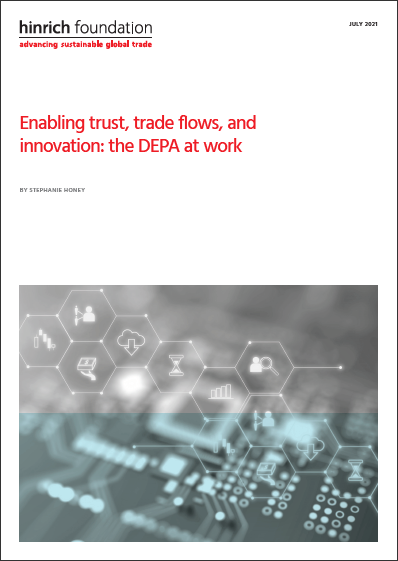Published 21 July 2021
Even before the ink was dry on the Digital Economy Partnership Agreement (DEPA), signed between Chile, New Zealand, and Singapore, other countries including the US expressed interest in following suit. Understand the much-discussed DEPA, and its goal to realize the full potential of digital trade for businesses while also safeguarding policy space for governments.
Three significant trends have emerged in the last decade across different forms of digital trade. First, there has been a significant increase in both volume and value. According to recent estimates, the “digital economy” comprises 15.5 percent of world GDP, with the value of e-commerce sales perhaps twice that share. The second trend involves many new regulations, often incoherent in scope and effect. As a result, the third trend is becoming more prevalent: the rise in many kinds of digital trade restrictions.
The COVID-19 pandemic has exacerbated these trends. According to one estimate, COVID has accelerated the digitalisation of business operations by up to a decade. The move towards more digital governance is also becoming more widespread with many recent free trade agreements (FTAs) including “e-commerce” chapters and provisions. Six months into the pandemic, however, a new kind of digital trade agreement was ratified with, very fittingly, the electronic signatures of three small, open, Asia-Pacific economies: New Zealand, Singapore, and Chile. Since that virtual signing ceremony, several similar agreements have followed or are in prospect.
In this paper, former New Zealand trade negotiator Stephanie Honey explores several policy options for digital trade governance. It outlines the innovative features of the DEPA approach and details its goal to realise the full potential of digital trade for businesses, while also safeguarding policy space for governments. The paper also reflects on the DEPA’s scope of impact, given that many of its provisions are “soft law” rather than legally binding rules – and whether flexibility might in fact be an advantage in this fast-moving area.
© The Hinrich Foundation. See our website Terms and conditions for our copyright and reprint policy. All statements of fact and the views, conclusions and recommendations expressed in this publication are the sole responsibility of the author(s).







